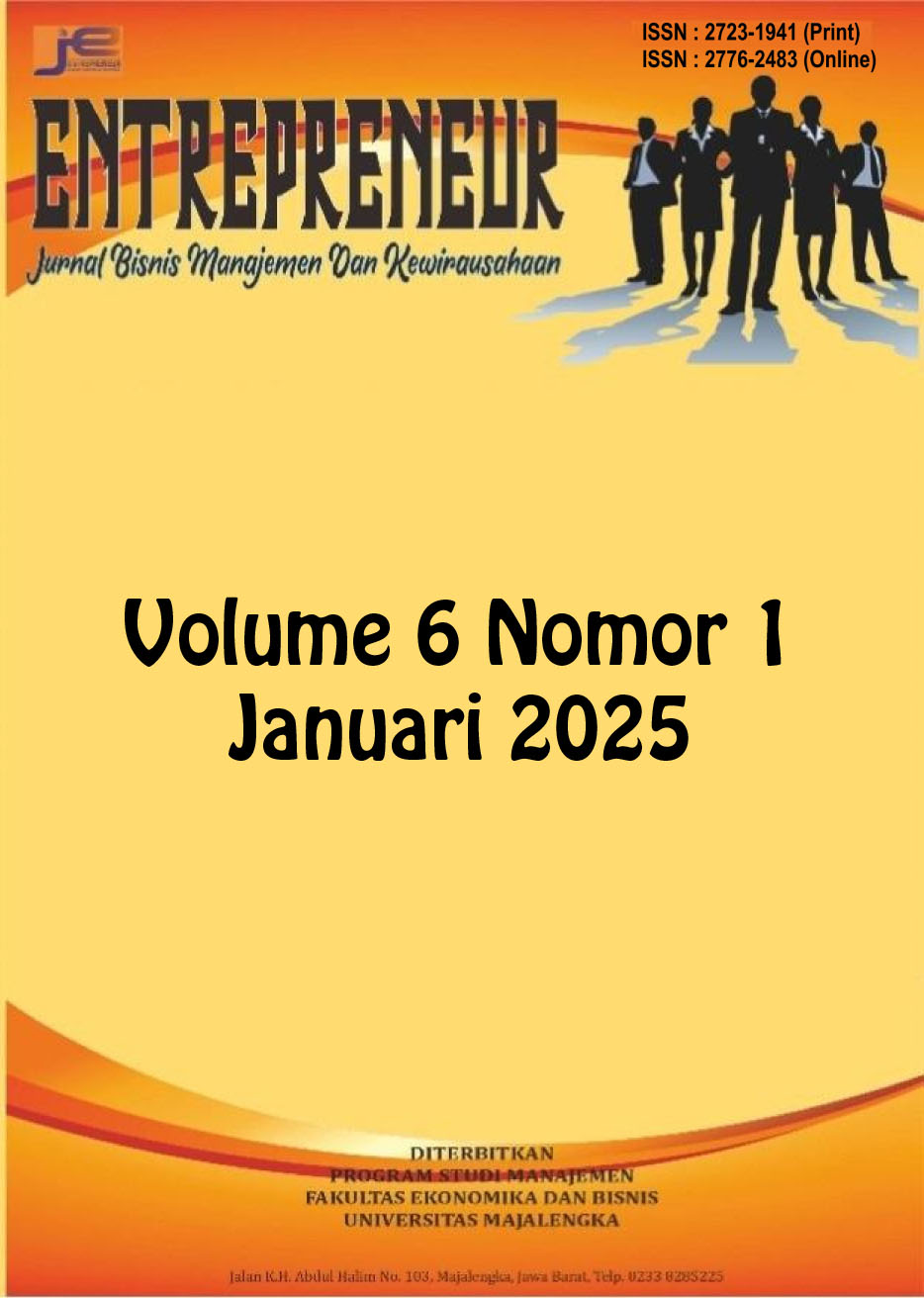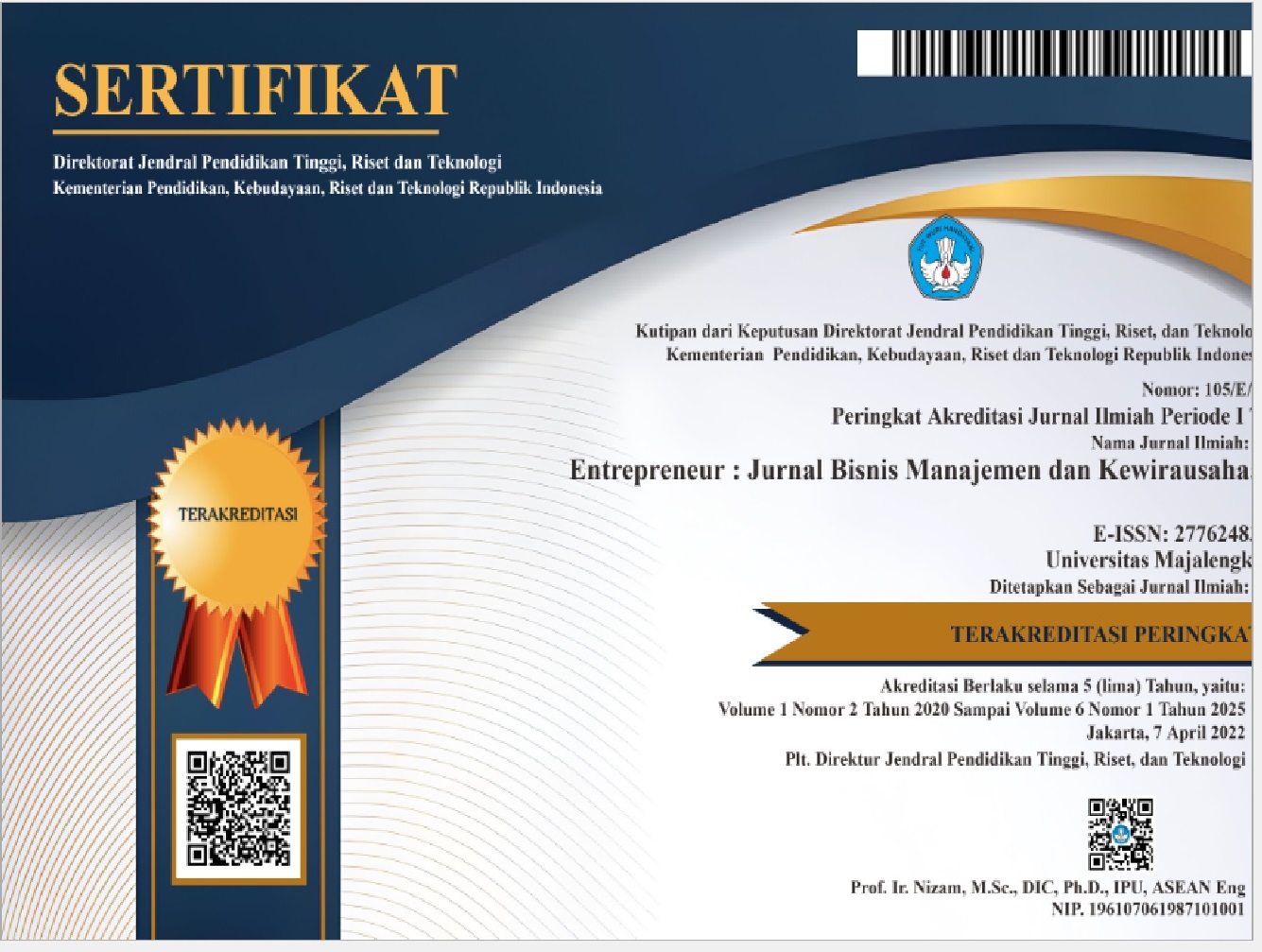Eksplorasi Pandangan dan Minat Generasi Y dan Z Terhadap Transformasi Koperasi
DOI:
https://doi.org/10.31949/entrepreneur.v6i1.12961Abstrak
Koperasi telah lama menjadi salah satu pilar utama perekonomian Indonesia, namun minat generasi muda terhadap model bisnis ini mengalami penurunan di era digital. Transformasi koperasi melalui inovasi dan digitalisasi menjadi tantangan sekaligus peluang untuk menarik keterlibatan Generasi Y dan Z. Penelitian ini bertujuan untuk mengeksplorasi faktor-faktor yang mempengaruhi pandangan dan minat kedua generasi tersebut terhadap koperasi, dengan fokus pada inovasi digital, keberlanjutan sosial, dan akses teknologi. Menggunakan pendekatan kualitatif dengan desain fenomenologi, penelitian ini melibatkan wawancara semi-terstruktur dengan 5 informan dari Generasi Y dan Z yang memiliki pengalaman atau ketertarikan terhadap koperasi. Analisis tematik digunakan untuk mengidentifikasi pola temuan. Hasil penelitian menunjukkan bahwa meskipun Generasi Y dan Z memiliki ketertarikan terhadap koperasi yang mengusung nilai keberlanjutan dan digitalisasi, masih terdapat kendala berupa keterbatasan pemahaman, pengalaman negatif, serta kurangnya informasi mengenai koperasi. Studi ini menegaskan pentingnya inovasi dalam produk dan layanan koperasi serta peningkatan literasi dan aksesibilitas koperasi bagi generasi muda. Oleh karena itu, koperasi perlu beradaptasi dengan memanfaatkan teknologi digital dan memperkuat strategi promosi berbasis keberlanjutan agar lebih relevan dan menarik bagi Generasi Y dan Z.
Kata Kunci:
Digitalisasi; Generasi Y; Generasi X; Inovasi; Koperasi.Unduhan
Referensi
Albert, S., & Whetten, D. A. (1985). Organizational identity. Research in Organizational Behavior, 7, 263–295.
Armillei, R., Wilson, B., & Reeves, J. (2024). Embedding a Circular Economy through Local Government in Gippsland: A Case Study, Utilizing Smart Specialization Methodology.
Ajzen, I. (1991). The theory of planned behavior. Organizational Behavior and Human Decision Processes, 50(2), 179–211. https://doi.org/10.1016/0749-5978(91)90020-T
Belz, F. M., & Peattie, K. (2012). Sustainability marketing: A global perspective. Wiley.
Broyde, Z. (2024). Ecoeuroregional Model Answering Common Challenges of Green Deal, 3 Sea Initiatives, and EU Strategy for Danube Region.
Čamo, L., & Miraščija, N. D. (2024). From Like to Millennial Diplomacy - EU Strategy Campaigns in Engaging Young Europeans.
Elkington, J. (1997). Cannibals with forks: The triple bottom line of 21st-century business. Capstone.
Huang, X., & Chiu, S. (2023). Generation Z and the future of social entrepreneurship: A case study. Journal of Business Ethics, 145(2), 321–337.
Ikeata, A. (2024). Improving Shopping Experience in Apparel Setting in Turku.
International Cooperative Alliance. (1995). The cooperative identity, values & principles. International Cooperative Alliance.
Koehler, L., Jones, C., & Farias, S. (2023). The rise of sustainability in cooperatives: What Gen Z expects. Sustainability Research, 11(4), 572–584.
Manwaring, M., Clark, S., & Summers, A. (2022). Digital transformation in cooperatives: A global perspective. Journal of Co-operative Studies, 55(3), 144–159.
Mannheim, K. (1952). The problem of generations. Psychosociological Essays. Routledge.
Putnam, R. D. (2000). Bowling alone: The collapse and revival of American community. Simon & Schuster.
Rogers, E. M. (2003). Diffusion of innovations (5th ed.). Free Press.
Schiffman, L. G., & Kanuk, L. L. (2010). Consumer behavior (10th ed.). Pearson Prentice Hall.
Smith, J. (2021). The youth perspective: Exploring Generation Z’s views on cooperatives in the digital age. Journal of Social Innovation, 23(1), 45–58.
Smith, L., & Johnson, M. (2021). Digital disruption and cooperatives: The rise of Gen Z and the challenges faced by traditional models. Cooperative Economics Review, 30(2), 120–135.
Zeithaml, V. A. (1988). Consumer perceptions of price, quality, and value: A means-end model and synthesis of evidence. Journal of Marketing, 52(3), 2–22.

Diterbitkan
Cara Mengutip
Terbitan
Bagian
Lisensi
Hak Cipta (c) 2025 Dienni Ruhjatini Sholihah, Dea Delia Lestari, Risty Rahma Dafina

Artikel ini berlisensiCreative Commons Attribution-ShareAlike 4.0 International License.
COPYRIGHT NOTICE
An author who publishes in the Entrepreneur: Jurnal Bisnis Manajemen dan Kewirausahaan agrees to the following terms:
1. Author retains the copyright and grants the journal the right of first publication of the work simultaneously licensed under the Creative Commons Attribution-ShareAlike 4.0 License that allows others to share the work with an acknowledgment of the work's authorship and initial publication in this journal
2. The author is able to enter into separate, additional contractual arrangements for the non-exclusive distribution of the journal's published version of the work (e.g., post it to an institutional repository or publish it in a book) with the acknowledgment of its initial publication in this journal.
3. The author is permitted and encouraged to post his/her work online (e.g., in institutional repositories or on their website) prior to and during the submission process, as it can lead to productive exchanges, as well as earlier and greater citation of the published work







